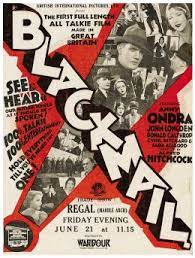
BLACKMAIL
UK, 1929, 85 minutes, Black-and-white.
Anny Ondra, John Longden, Donald Calthrop, Cyril Ritchard, Sarah Allgood, Charles Paton, Phyllis Konstam, voice of: Joan Barry.
Directed by Alfred Hitchcock.
Alfred Hitchcock had made quite an impression in British cinema during the 1920s, quite a number of films, many still available on You Tube. This was his last silent film, his first talkie film, the final product a combination of both?
The film is based on a play by Charles Bennett, opened out by Hitchcock. Czech actress Anny Ondra is the first of the Hitchcock blondes, quite a tradition throughout his films. She was a celebrated Czech actress but her accent was too difficult for talkies and she was dubbed by Joan Barry. She went on to have a significant career in German films (and marrying the world boxer, Max Schmelling).
John Langdon is the police inspector, much of his performance non-verbal, the silent style with close-ups, expressions and body language. Which is also the case with Anny Ondra many times. The villain is Donald Calthrop, a con man, a blackmailer, realising that Anny Ondra has gone into the flat of a seductive artist, played by Cyril Ritchard, an attempt to blackmail her.
She is bewildered, killing the artist in self defence, ultimately wanting to confess.
There are complications in the reputation of the blackmailer, and his pursuit through the London streets and a taxi and then his arrival at the British Museum, the columns, the various rooms of the exhibits, eventually on the glass roof, pursued, and falling to his death through the glass. (And Hitchcock later relying on tall buildings and monuments for drama, the Statue of Liberty, the Albert Hall…).
Blackmail features quite strongly, many sequences and quite some analysis in Mark Cousins’ documentary My Name is Alfred Hitchcock indicating Hitchcock’s cinema artistic sensibilities as well as his themes..
- Alfred Hitchcock in the 1920s, development of his techniques, storyboarding, fixed camera, swirling swivelling camera, close-ups, editing, pace?
- The last silent film for Hitchcock, first use of sound? The combination?
- The black-and-white photography, the atmosphere of London, the streets, vehicles, New Scotland Yard, the shop, the flat, modern atmosphere for the 1920s, costumes, decor? Background musical score?
- Introduction, Frank, the police, the information, the vehicle, coming to the block of flats, entry, the criminal smoking and reading in bed, reaching for the gun, the struggle, getting dressed, taken to New Scotland Yard, the interrogations? His attitude? The witnesses, the lineup, his being identified? Establishing Frank and the work of the police?
- Frank, his relationship with Alice, going to the restaurant, difficulties in finding a place, her note, the arrival of the artist, her being whimsical, Frank leaving, waiting outside the door, seeing Alice with the artist?
- The artist, suave manner, walking Alice home, talk, his apartment, inviting her out, her initial resistance? Her going in, going upstairs, his mail, the landlady, the note, the frequent visitor and his demanding money? Alice upstairs, the drink, seeing the dress, her being urged to change, reluctance, changing, the camera focusing on her, the artist playing the piano, the lyrics of the modern girl? His artwork, her trying her painting, the signature, later brushing it over? The seduction, his attack, forcing Alice, Hitchcock simply showing the curtain, movement, reaching for the knife, no movement, her reaction, bewilderment, delaying, getting dressed, carefully leaving, in the street, going home, upstairs, into bed, her mother with the breakfast, coming down for the day?
- The indication of Tracy, outside, watching? And the glimpses of the policeman patrolling the streets?
- Frank, the investigation, his finding Alice’s club, her previously losing it at the restaurant? In his pocket, observed by Tracy, Frank going to the shop, trying to get the truth from Alice, giving her the glove? Their being interrupted?
- Tracy, arriving, smug, smile, casually leaning on the counter, demanding the cigar, that Frank pay for it, wanting food, Alice asking her mother, her mother’s hostile reaction? Tracy smoking the cigar, Alice’s father and his response?
- The blackmail, Tracy and his smooth talk, the breakfast, in the armchair, Frank giving him money?
- The phone call, the police discussing the identity of the writer of the note, the description, his being wanted, the police coming for his arrest? Frank, off the phone, smug in his response?
- Alice, the aftermath, writing the note to Frank, wanting to confess, going to get new Scotland Yard, friendly with the officer at the door, going into the Inspector’s office, Frank present, about to confess, the phone call, the Inspector leaving?
- The encounter with Tracy, his flight, the taxi to the British Museum, the elaborate finale, on the roof, his crashing through the glass?
- Alice, willing to confess, saved, her relationship with Frank?